So it’s that time of year again. The weather is getting chilly and you are worried about your pool pipes freezing.
One question common among pool owners is how long does it take for pipes to freeze solid? Another question is what temperature to close the pool? The answers to these questions and more will be revealed in this post.
Let’s dive in.
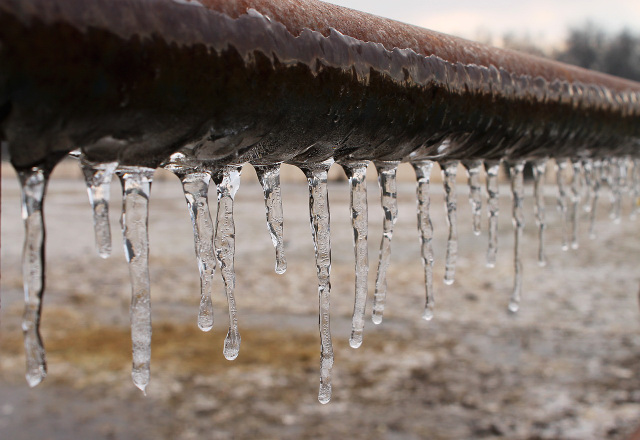
Article Contents
Why Do Pool Pipes Freeze?
First things first, it’s not the pool pipes that freeze but the water in the pool pipes. When the pool doesn’t have any prevention against extreme weather, the water will freeze up when the weather temperature gets below freezing.
Frozen pool pipes are more common with above-ground pools. This is because the pool plumbing and filter system are above ground.
Inground pool pipes also freeze, but it isn’t as common since the pool pipes are usually installed underground. However, even though the water in the underground section of the pipes may not freeze as easily, the water in pipes at the surface of the pool will freeze. The skimmer, pool pump and filter are equally prone to freezing.
So how long does it take the pool pipes to freeze? Let’s find out.
How Long Do Pool Pipes Take To Freeze?
Above ground pool pipes will freeze in under 6 hours if exposed to weather temperatures below 32° F (0°C) if they are not protected from the cold. Inground pool pipes will take 5 – 7 days of continuous temperatures below 32°F (0°C) to freeze up.
These times do vary and there are several factors that will determine how long it takes for pool pipes to freeze.
Water freezes when exposed to cold temperatures at or below 32 degrees Fahrenheit (or 0 degrees Celsius). However, the time it takes for the pool pipes to freeze largely depends on the type of pool, where the pool is, the location of the pipes and the temperature of the air.
Above ground pool pipes freeze up quicker than in-ground pools because the in-ground pool pipes are buried underground, giving the pipes some sort of insulation. Plus the earth’s surface is colder on top.
Also, pool pipes will freeze quicker at night and when the water level in the pool is low.
The weather is colder at night and if the water level is low, the pool system will suck in cold air, making the pipes freeze up faster.
For indoor pools, frozen pipes is not common since the pool system isn’t exposed to the freezing outdoor weather.
For inflatable pools, the water will begin to freeze within an hour if exposed to extreme cold temperatures. This is because inflatable pools are poorly insulated.
How Cold Does It Need To Be For Pool Pipes To Freeze Solid?
The weather needs to be at or below 20 degrees Fahrenheit (-6.7°C) the pool pipes to freeze solid. At 32°F (0°C), water will begin to freeze up and will eventually freeze solid but after some hours or days.
However, at 20 degrees Fahrenheit, most pools pipes will freeze over solid quickly. Even insulted pool pipes will struggle to keep the water temperature above freezing when the weather drops to or below 20°F (-6.7°C).
So what happens in the pool when the pipes start to freeze? The quick answer is the pool equipment will get damaged. For the detailed answer, keep reading.
The Dangers of Frozen Pool Pipes
When the pool pipes get frozen, the pool plumbing is at risk. As explained earlier, it’s not the pool pipes that freeze. It’s the water in the pool pipes that gets frozen.
When a water molecule freezes, it can expand up to 9% due to its dense nature. And if the water has nowhere to go, the only option is for the pool pipes to expand. It’s this expansion that can cause cracks in the pool plumbing. Metal and PVC pipes are both prone to breaking.
Frozen pool pipes can also cause the pool pipe unions and fittings to become loose allowing cool air to get in and cause the pipes to freeze solid. Loose pipe unions and fittings can also cause leaks when you run the pool system.
But that’s not all. Let’s check out some other dangers of frozen pool pipes.
Damaged Pump System
Your pool pump can be damaged by freezing temperatures. This problem is exasperated when seals are loose or cracked o-rings, which will allow air to get into the pump system. The cold air sucked in causes the water running through the pump system to freeze up.
Since pool pumps are largely made from plastic, the plastic material can easily crack due to expanding water. The worst part is, you likely won’t notice the cracks because until you run water through the pump again – the issue will show up as leaks.
If this happens, it’s time for a new pump.
Cracked Pool Filter Housing
The filter housing or canister is at risk of being cracked from expanding ice. Though pool filters housings are designed to handle increased pressure, the canister can only take so much.
As the ice expands rapidly, the canister will expand to the point of breaking and damage the filter beyond repair. Usually, this damage is pretty obvious, but sometimes it won’t be noticeable until the spring when you start your pool again.
Tip: If you can see water dripping or leaking from the top of the filter housing during winter, it’s usually a sign of freeze damage.
Damaged Pool Walls
In frosty cases where the ice starts to form on the water surface in the pool, then the whole pool is at risk of tearing up. For above-ground pools, the pool walls will be stretched as the ice spreads across the pool water.
For in-ground pools, the expanding ice can crack pool walls or damage the pool surrounds, causing thousands of dollars in repairs.
Cracked Skimmer Box
Ice damage in skimmer boxes is particularly common. When the water freezes it expands. And if the expanding water has nowhere else to go, it will push on the sides of the skimmer box, causing it to crack. This isn’t repairable.
You can however use something called a gizzmo. Don’t worry, this isn’t Gizmo from the Gremlins movie.
A gizzmo for your pool is a small plastic hollow device that is inserted into the skimmer box. Since the device is hollow, when the water freezes and the ice expands, the ice will expand into the device, crushing it in the process, which protects your skimmer box.
Here’s a Gizzmo you can use here:
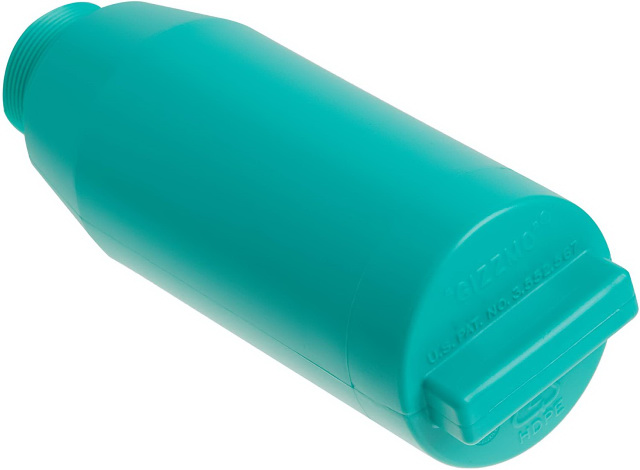
Click here to check the price >>
Many pool owners believe underground pool pipes will not freeze since the pipes are buried. Is this true? Let’s find out.
Will Underground Pool Pipes Freeze?
Underground pool pipes can freeze in cold climates when the temperature is below 20°F (-6.6°C) for several days. If the pipes are buried less than 2ft (61cm) and the soil is moist or particularly porous, the pipes are much more likely to freeze.
The parts of the pipes that extend out of the ground are much more susceptible and will definitely freeze after several days of sub-freezing temperatures.
The biggest factor for underground pool pipes to freeze, after the temperature, is the depth the pool pipes are buried and the frost line of the soil. For underground pool pipes to freeze, frost has to travel into the soil to get to the pipes. The deeper the pipes are buried, the less likely pool pipes are to freeze.
The standard pool pipe depth for in-ground pools is about 2ft below ground level. For pool pipes to freeze at this depth, frost has to penetrate about 25 inches into the ground. This is where the soil frost line comes in.
The frost line refers to the depth at which underground water will freeze. In other words, it refers to how deep the frost has to penetrate the soil for pipes underneath to freeze. The average frost line is just over 20 inches (less than 2 feet) into the ground.
If the frost line in your area is greater than 30 inches, then pool pipes buried 2 feet below the ground will be affected, but it will take several days of constant frost penetration in the soil for the pipes to freeze.
Also, the condition of the soil matters. If the soil has a lot of moisture content, then the pool pipes will freeze easily. And if the soil is very porous, then frost can travel down quicker and get to the pool plumbing.
Will Running The Pool Heater Prevent Pool Pipes From Freezing?
Running the pool heater will prevent the pool pipes from freezing if the heater is powerful enough and is run for long enough. It will be expensive to run a pool heater throughout winter, though.
Here’s a more in-depth answer.
First, the weather temperature must be above 20 degrees Fahrenheit. If the weather temperature drops to or below 20 degrees, the pool heater will struggle to keep the water above freezing (or above 32 degrees F).
Also, the pool heater must be left running long enough to keep the pool water above 32 degrees (0 degrees Celsius). The standard time frame is to keep the heater running for at least 12 hours a day during the winter months.
Lastly, the pool heater should be capable of producing the required amount of heat to keep the pool water temperature above freezing. So if you are using a small pool heater for a large pool, it won’t cut it during the winter.
Tip: Running the heater at night when the weather is colder helps to prevent pipes from freezing. Also, covering the pool at night, with a pool cover, and while the pool heater is running, helps to retain heat and save cost.
Will Running the Pump Prevent Pool Pipes Freezing?
Running the pool pump will slow down the rate at which the pool water and pipes will freeze. Pool water and pipes will eventually freeze regardless of if the water is moving or not if the temperature drops below 32°F (0°C. The time it takes to freeze depends on temperature, if the pipes are insulated and if they are underground or above ground.
Many pool owners believe that if their pool system is kept running, the water can’t freeze. This is false.
Don’t believe me? Here is why.
Each water molecule is made of hydrogen atoms (the positive charge) and oxygen atoms (the negative charge). As the water moves, the molecules rub against each other creating heat that makes the water warmer.
However, the heat produced only keeps the water from freezing when the temperature is around 30°F (-1.1°C). If the temperature drops well below 30°F (-1.1°C), the heat produced by the water molecules will be very insignificant.
The water molecules will gradually lose charge and move slower. The colder the temperature gets, the slower the water will move till it gets to a stage where the water becomes semi-solid or soft ice. When water gets to this stage, it can’t move.
Since there is no water movement. there is no heat from the water molecules. Eventually, the water will freeze solid.
What Temperature Should I Close My Pool?
If you’re not going to be swimming and let’s face it, most of us won’t, you can close your pool off for the winter at around 50°F (10°C). But you could let it go until the temperature is around freezing.
If you do let the temperature get to freezing, make sure you have a freeze damage prevention measure in place.
If your pool pipes are well insulated, or you have a freeze guard installed, then you can leave your pool open. But be prepared to take on an extra pool maintenance workload. One issue with this is that if the power goes out and your pool pump stops, the skimmer and filter will freeze at around 30°F (-1°C). And that will be expensive if that happens.
If the pool pipes aren’t insulated and you don’t have a freeze guard installed, then you should close your pool when the temperature is above freezing to prevent freeze damage.
Let’s check out some other ways to prevent freeze damage and pool pipe freezing in your pool system, for those pool owners that want to take on the winter.
How To Protect and Prevent Pool Pipes From Freezing
The following prevention methods should only be used when the weather temperature is above 20°F (-6.7°C).
If you live in frosty climates or areas where the weather temperature drops to or below 20°F (-6.7°C), your best bet is to winterize or close the pool. Find out how to do that:
How to Close and Winterize an Inground Pool
How to Close and Winterize an Above Ground Pool
Here are a few ways to prevent pool pipe freezing:
1) Keep The Pump Running
A good way to prevent freeze damage is to keep the pool running 24/7. This helps to maintain water temperature by keeping the water flowing. As the water circulates, heat is produced and it becomes more difficult for pipes to freeze up.
You should know that running the pool system alone can’t keep your pool water from freezing through the winter months.
Tip: Variable speed pool pumps are ideal for winter months. The pool pump allows you to alternate between different speeds which means you can run your pump very slowly most of the time, saving you electricity.
2) Insulate the Pipes
You can also prevent pool pipes from freezing by insulating the pool plumbing. You can do this by:
- Wrapping towels and blankets around the pool pipes.
- Using pool insulation tapes. These tapes can be wrapped around pool plumbing and they are usually made from materials like foil that retain heat.
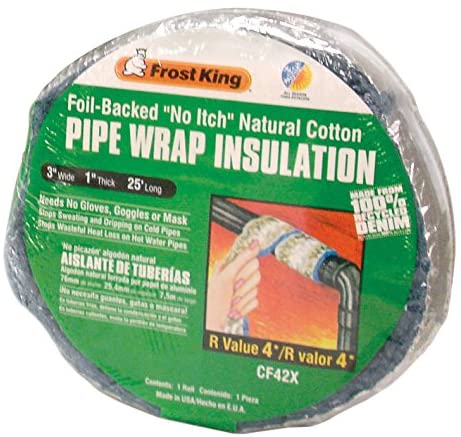
Click here to check the price >>
3) Maintain Proper Water Level
If you plan to leave your pool open during winter, always ensure that the water level is about mid-way up the skimmer. If the water level is below the mid-point of the skimmer, then the pool system will be starved of water.
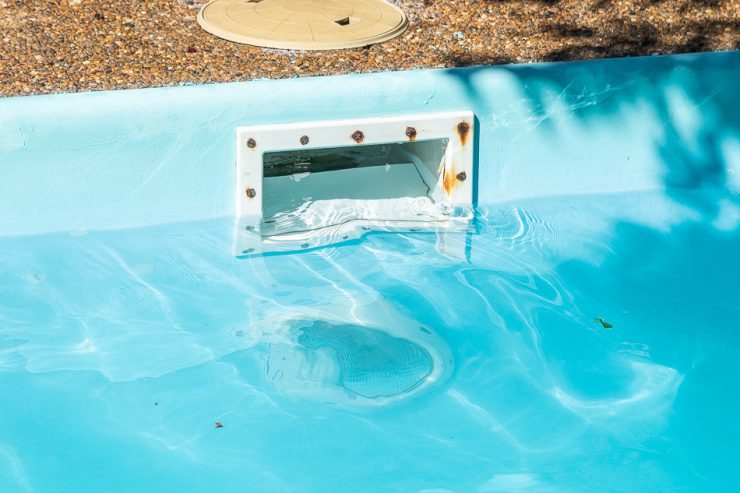
4) Install Freeze Protection Timers
Freeze protection timers or freeze guards are devices that automatically run the pool system when the temperature gets around freezing.
Freeze protection timers are designed with temperature sensors. The sensor detects when the weather is creeping towards freezing temperatures and switches on the pool pump automatically to slow down freezing.
Freeze protection timers are great for busy pool owners that want to keep the pool open during winter. Here are some great choices.
Intermatic freeze protection control. This product turns on the pool pump and heater (if installed) based on the set temperature by the user.
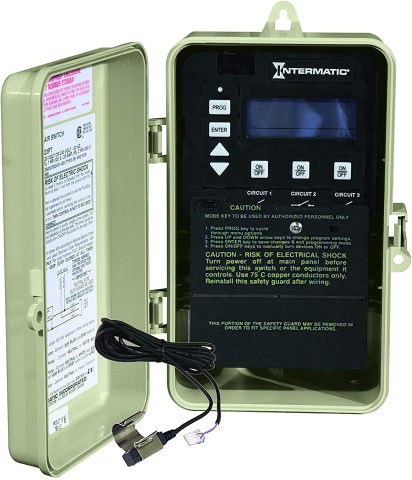
Click here to check the price >>
Intermatic PE153PF freeze protection. This product has up to 7 pre-programmed combinations to choose from and it can control both single speed and dual speed pool pumps.
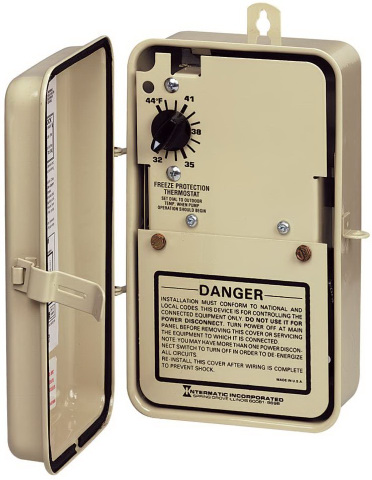
Click here to check the price >>
You should know that keeping your pool open during the cold months is expensive as you have to pay more to keep the pump running. You may also have to buy extra pool equipment and insulation pads.
So if you are on a tight budget, it’s best to close the pool for the winter.
Related Reading: Should You Get a Pool Pump Timer? Is it Necessary?
Final Thoughts
Overall, freeze damage is a serious concern and it can happen to anyone regardless of the type of pool. But with proper prevention methods, you can extend your swim time during the winter so you don’t have to close the pool.
Always remember that all prevention measures are subject to the weather temperature. If it gets too cold, it’s best to winterize the pool.

